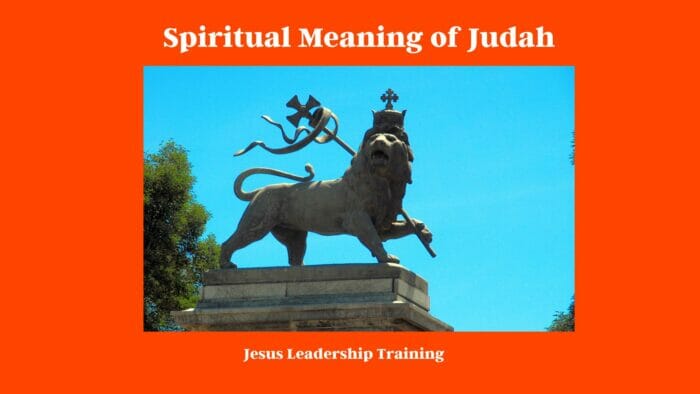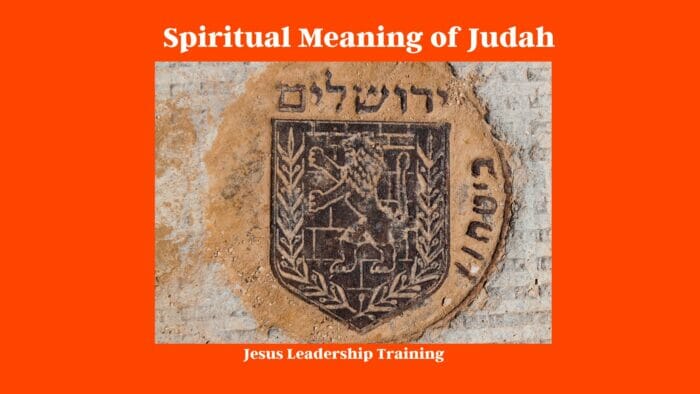Spiritual Meaning of Judah – The realm of spirituality is a tapestry woven with deep meanings and symbolism, often hidden within names, places, and ancient texts. One such intriguing element is the spiritual meaning of Judah. In this article, we embark on a journey to unravel the profound significance of Judah and its spiritual implications. From biblical references to symbolic interpretations, we delve into the heart of Judah, exploring its hidden depths.
Table of Contents
The Enigmatic Spiritual Meaning of Judah
Exploring the Origins
The name Judah finds its origins in ancient Hebrew, derived from the root word “Yada,” which means “to praise” or “to give thanks.” This name holds immense significance as it embodies the essence of gratitude and reverence.
Unveiling Symbolism in Biblical Context
In the biblical context, Judah has deep symbolic meaning. It represents praise, leadership, and royalty. Judah is the fourth son of Jacob and Leah, and he became the progenitor of one of the twelve tribes of Israel. The spiritual significance of Judah can be seen in his role as a leader and the lineage through which the messianic king, Jesus Christ, would emerge.

The Spiritual Significance of Judah in Various Contexts
Judah in Kabbalah
In Kabbalah, an esoteric tradition of Jewish mysticism, Judah represents the sefirah (divine emanation) of Malchut (Kingdom). This sefirah embodies the divine aspect associated with sovereignty and rulership, reflecting the kingly qualities present within each individual.
Judah in Numerology
When exploring the spiritual meaning of Judah through numerology, we encounter further insights. Each letter in the Hebrew alphabet carries a numerical value, and the sum of these values provides additional depth to the interpretation. The numerical value of Judah in Hebrew is twenty-five (yod = 10, vav = 6, dalet = 4, and heh = 5). This number signifies strength, spiritual growth, and the ability to overcome challenges.
Etymology of the Biblical Name Judah
The etymology of the Biblical name ‘Judah’ is an interesting topic that has been studied for centuries. In the Bible, Judah is one of the twelve sons of Jacob and Leah, and the ancestor of the tribe of Judah. His name has a deep symbolic and spiritual significance, and its origin has been linked to several languages and cultures.
Origin (Meaning)
The origin of the name Judah is uncertain, but it is believed to have its roots in a Hebrew word. It is thought to derive from the Hebrew word ‘yadah’ which means ‘praise’ or ‘confession’. It is also believed to be related to the Hebrew verb ‘hudah’ which means ‘to thank’.

Hebrew
In the Hebrew language, the name Judah is spelt ‘Yehudah’ and is pronounced ‘yeh-hoo-dah’. It is believed that the name Judah comes from the Hebrew word ‘yehud’ which means ‘praise’. The name was also used to refer to the tribe of Judah, which was one of the twelve tribes of Israel.
Greek
In the Greek language, the name Judah is spelt ‘Ioudas’ and is pronounced ‘yo-das’. It is believed that the name Judah comes from the Greek word ‘ioudaios’ which means ‘praise’. This is similar to the Hebrew word ‘yadah’ which also means ‘praise’.
Aramaic
In the Aramaic language, the name Judah is spelt ‘Yehudah’ and is pronounced ‘yeh-hoo-dah’. It is believed that the name Judah comes from the Aramaic word ‘yihudah’ which means ‘confession’. This is similar to the Hebrew verb ‘hudah’ which also means ‘to thank’.

The etymology of the Biblical name Judah is an interesting topic that has been studied for centuries. The name has its roots in several languages and cultures, and is believed to be related to words such as ‘praise’, ‘confession’, and ‘to thank’. No matter its origin, the name of Judah is a powerful reminder of our spiritual heritage.
here’s a table with baby names that are derived from the biblical name of Judah:
| Baby Names Derived from Judah | Gender | Meaning |
|---|---|---|
| Judah | Male | “Praise” or “Thanks” |
| Jude | Male | Short form of Judah |
| Jud | Male | Short form of Judah |
| Judd | Male | Variant of Judah |
| Judy | Female | Feminine form of Judah |
| Judita | Female | Feminine form of Judah in several languages |
| Judith | Female | Feminine form of Judah |
The name Judah and its derivatives are popular choices for parents due to their biblical origin and meaningful interpretation. In the original Hebrew, Judah (Yehudah) signifies “praise” or “thanks,” connoting a grateful spirit. As always, the choice of a baby’s name can be deeply personal and may reflect individual, familial, cultural, or spiritual connections.
History of Biblical Judah (God)
The region of Judah, rooted deeply in biblical history, plays a significant role in understanding the historical, cultural, and religious narratives of the Judeo-Christian tradition. But what exactly is the history behind Biblical Judah? Let’s delve into it.
here’s a table providing major events associated with the Tribe of Judah according to the Bible:
| Major Events for the Tribe of Judah | Bible Verse | Description |
|---|---|---|
| The Birth of Judah | Genesis 29:35 | Judah was the fourth son of Jacob and Leah. His birth is significant as he becomes the ancestor of the Tribe of Judah. |
| Judah’s Intercession for Benjamin | Genesis 44:18-34 | When Benjamin was accused of stealing and threatened with enslavement in Egypt, Judah stepped forward and offered himself as a substitute, showing his growth in character. |
| Jacob’s Blessing | Genesis 49:8-12 | In Jacob’s blessing to his sons, he prophesied that Judah would be a leader among his brothers and from his line would come rulers, including the Messiah. |
| The Tribe’s Role in the Conquest of Canaan | Joshua 15 | The Tribe of Judah led the Israelites in their conquest of Canaan and were given a large portion of land, including the city of Jerusalem. |
| David from the Tribe of Judah | 1 Samuel 16:1-13 | David, the second king of Israel and an ancestor of Jesus, was from the Tribe of Judah. His reign established the Tribe of Judah’s prominence in Israel’s history. |
| The Southern Kingdom “Judah” | 1 Kings 12:21-24 | After Solomon’s death, Israel split into two kingdoms. The southern kingdom, known as Judah, was led by the Tribe of Judah. |
| Line of Christ | Matthew 1:1-16 | The genealogy of Jesus Christ is traced back to the Tribe of Judah, fulfilling Jacob’s prophecy and highlighting the tribe’s significant role in biblical history. |
It’s important to note that the Tribe of Judah plays a significant role in the biblical narrative, not just as a historical tribe of Israel, but as the line through which King David and Jesus Christ came. These events and figures have had a significant impact on the development of Jewish and Christian beliefs and traditions.
The Genesis: Early History of Judah
Territory and People
According to the Old Testament, Judah was one of the twelve tribes of Israel, named after the fourth son of the patriarch Jacob. Situated in the southern part of the region, it was rich in vineyards and olive groves, a land praised for its beauty and fertility.
From Tribe to Monarchy (Baby)
The transition of Judah from a tribal society to monarchy is a fascinating tale. The Book of Judges speaks about this era, wherein leadership was not centralized but rather given to the charismatic “judges.”
The United Monarchy: Saul, David, and Solomon
David’s Conquest of Jerusalem
David, the second king of Israel, played a significant role in the expansion and establishment of the United Monarchy. He made Jerusalem the capital, which consequently increased the importance of Judah in the geopolitical scenario.
Solomon’s Reign and Legacy
Solomon, David’s son, consolidated the power of the kingdom, establishing it as a significant power in the region. His most renowned accomplishment was the construction of the First Temple in Jerusalem.
The Kingdom of Judah
Political and Social Structure
Following Solomon’s death, the united monarchy divided into two: the Kingdom of Israel in the north and the Kingdom of Judah in the south. Judah maintained its Davidic monarchy and Jerusalem as its capital.
The Babylonian Exile
One of the most significant events in the history of Judah was the Babylonian exile. In 586 BCE, the Babylonians sacked Jerusalem, destroyed the Temple, and carried off a large portion of the population to Babylon.
Judah in the Persian Period
Under Persian rule, the people of Judah were allowed to return to their homeland and rebuild their Temple, marking a period of reconstruction and renaissance.
Judah during Hellenistic and Roman Times
The Maccabean Revolt
The Hellenistic period brought the Greek culture and influence to Judah. When the Seleucid king, Antiochus IV, attempted to impose Hellenistic religion and culture, it led to the Maccabean Revolt, securing Judah’s independence for a time.
Roman Occupation and the Destruction of the Temple
In the 1st Century BCE, Judah fell under Roman rule. The Roman governor, Pontius Pilate, was infamous for his ruthless rule. In 70 CE, the Second Temple in Jerusalem was destroyed following a Jewish rebellion against Rome.
In conclusion, the history of Biblical Judah is a captivating narrative that encompasses tribal beginnings, monarchial grandeur, exile, and resurgence. It’s an epic tale of faith, resilience, and survival, against a backdrop of political, cultural, and religious changes. The history of Judah is inextricably linked to the formation of Jewish identity and faith, shaping much of today’s Judeo-Christian world.
Jesus – The Lion of Judah
Jesus being referred to as the “Lion of Judah” is deeply rooted in biblical tradition, reflecting both the history and prophetic literature of the Bible.
The title “Lion of Judah” originates from the book of Genesis (49:8-12), where Jacob blesses his twelve sons before his death. In this blessing, Jacob refers to Judah, his fourth son, as a “lion’s cub” and prophesizes that “the scepter will not depart from Judah.” This phrase is traditionally interpreted to mean that the line of Judah will have a continuous ruling descendant. This is important as King David, and consequently Jesus (according to the New Testament), is traced back to the tribe of Judah, thus establishing the royal lineage.
Furthermore, in the New Testament, the Book of Revelation refers to Christ as the Lion of Judah. Revelation 5:5 states, “Do not weep! See, the Lion of the tribe of Judah, the Root of David, has triumphed.” This scripture is read as an affirmation of Jesus’ messiahship and his fulfillment of the prophecies related to the Davidic line, specifically of the tribe of Judah.
Therefore, the title “Lion of Judah” symbolizes Jesus’ royal authority, lineage, and fulfillment of biblical prophecy, emphasizing his role as the prophesied Messiah. The lion, a symbol of power, strength, and sovereignty, further underscores the majesty and kingship of Jesus.
FAQ: Frequently Asked Questions
Q: What is the significance of the name Judah in Christianity?
A: In Christianity, the name Judah holds great importance as it represents the lineage through which Jesus Christ, the Messiah, descended. It signifies the fulfillment of prophecies and the establishment of a divine kingdom.
Q: How does Judah’s spiritual meaning relate to personal development?
A: Judah’s spiritual meaning encourages individuals to embrace qualities of leadership, gratitude, and praise. By embodying these attributes, one can cultivate personal growth, inspire others, and establish a sense of purpose in their lives.
Q: Are there any specific symbols associated with Judah?
A: Yes, Judah is often symbolized by a lion, representing strength, courage, and kingship. The lion of Judah is a powerful emblem, reminding us of the regal qualities and spiritual significance associated with this name.
Q: Can the spiritual meaning of Judah be applied to everyday life?
A: Absolutely! Incorporating the spiritual meaning of Judah into daily life can bring a deeper sense of purpose, gratitude, and leadership. By expressing praise and appreciation, individuals can cultivate a positive mindset and inspire those around them.
Q: How can one explore the spiritual meaning of Judah further?
A: To delve deeper into the spiritual meaning of Judah, one can study ancient texts, engage in meditation or prayer, seek guidance from spiritual teachers
and explore the symbolism and interpretations within different spiritual traditions. Additionally, reflection and contemplation on the qualities associated with Judah can provide personal insights and a deeper understanding of its spiritual meaning.
Q: Are there any specific rituals or practices related to Judah?
A: While there are no specific rituals exclusively dedicated to Judah, incorporating practices of gratitude, praise, and leadership into one’s spiritual journey can honor the essence of Judah. These practices can take various forms, such as offering prayers of thanksgiving, engaging in acts of service and leadership within the community, or participating in sacred gatherings where praise and worship are central.
Q: Does the spiritual meaning of Judah have relevance in other cultures?
A: Although Judah has its roots in Hebrew and biblical contexts, the themes it embodies, such as gratitude, leadership, and praise, have universal significance. Cultures worldwide recognize the importance of these qualities and often incorporate them into their spiritual and philosophical teachings. While the specific name “Judah” may not be present, the underlying principles resonate across diverse cultures.
Q: How can understanding the spiritual meaning of Judah impact one’s spiritual journey?
A: Understanding the spiritual meaning of Judah can deepen one’s spiritual journey by providing guidance and inspiration. By embracing the qualities associated with Judah, individuals can cultivate a closer connection with the divine, develop their leadership abilities, and foster an attitude of gratitude and praise. This understanding can bring about a profound transformation in one’s spiritual path.
Q: Does the spiritual meaning of Judah have any relevance outside of religion?
A: Yes, the spiritual meaning of Judah extends beyond religious contexts. While its origins lie within biblical and spiritual traditions, the qualities it represents—such as gratitude, leadership, and praise—are applicable to individuals seeking personal growth, regardless of their religious or spiritual affiliations. The principles associated with Judah can inspire individuals to embody these qualities and make positive contributions to society.
Q: Are there any specific prayers or affirmations associated with Judah?
A: While there are no exclusive prayers or affirmations dedicated solely to Judah, one can create personal invocations, prayers, or affirmations that align with the qualities and symbolism of Judah. These can be expressions of gratitude, affirmations of leadership and empowerment, or heartfelt praises for the divine.
Q: How can the spiritual meaning of Judah inspire a sense of purpose?
A: The spiritual meaning of Judah, with its emphasis on leadership and gratitude, can inspire individuals to find their purpose in life. By recognizing their innate qualities and strengths, individuals can embrace leadership roles, contribute positively to their communities, and live a life of purpose and meaning.
Other Terms
- bible dictionary
- easton bible
- standard bible
- smith bible
- verb
- judah praise
- names
- sessions
- bible
- baby names
Final Thoughts – Spiritual Meaning of Judah
The spiritual meaning of Judah encompasses a tapestry of symbolism and interpretations. From its biblical origins to its representation in various spiritual traditions, Judah embodies qualities such as praise, gratitude, leadership, and royalty. Exploring the spiritual significance of Judah can guide individuals on their personal journeys, inspiring them to cultivate these qualities in their lives and find a deeper sense of purpose. As we uncover the hidden depths of Judah’s spiritual meaning, may we embrace its teachings and allow them to shape our lives positively.
Best Old Testament Commentaries
Below is a table featuring some renowned Old Testament commentaries, their publishers, and websites where they can be found. As always, it’s best to confirm availability on multiple platforms or the publishers’ websites.
| Commentary Name | Publisher | Website |
|---|---|---|
| The New International Commentary on the Old Testament | Eerdmans | Eerdmans |
| Word Biblical Commentary | Zondervan | Zondervan |
| Baker Commentary on the Old Testament | Baker Academic | Baker Academic |
| The Anchor Yale Bible Commentary | Yale University Press | Yale University Press |
| Tyndale Old Testament Commentaries | InterVarsity Press | InterVarsity Press |
| Expositor’s Bible Commentary | Zondervan | Zondervan |
| The Old Testament for Everyone | Westminster John Knox Press | Westminster John Knox Press |
Note: As with the New Testament table, this table provides generalized examples and does not list each volume within the commentary series. The commentaries can usually be found on the publishers’ websites or other online book retailers such as Amazon or Christianbook. It is always advisable to check for the most accurate and up-to-date information regarding availability.




